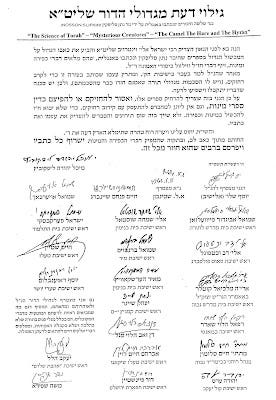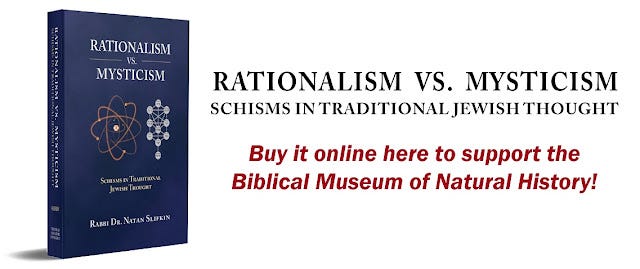A Ban on Rationalism vs. Mysticism?

Some people have asked me whether I'm afraid that my new book Rationalism vs. Mysticism will be banned. After all, it's vastly more controversial than my three previously banned books. The Table of Contents (which you can see on this page) reveals certain discussions that are completely unacceptable for many charedi Gedolei Torah, but the content of some innocently-titled chapters - in particular, "The Nature of Torah" - is even more heretical (from their perspective) and damaging to their worldview.
So am I afraid that it will be banned? This is a good question with a complicated answer. I'm going to respond in several posts. One will discuss the reasons why it might be banned, and another will discuss the reasons why it might not banned. In this post, I will explain why, whatever happens, I am not afraid - and how everything is completely different from sixteen years ago.
When three of my books were banned (and you can see all the documentation linked at this page), I was utterly devastated. It was an immensely upsetting time for me (and for my wife and family), and I was desperate to make it go away. I'm going to discuss all the ways in which the notorious cherem of 16 years ago harmed and hurt me, and why that wouldn't happen today.
1. Fear That I've Actually Done Something Wrong
Contrary to many people's image of me as an immensely self-assured, arrogant person, I'm actually constantly hounded by self-doubt. Moreover, whenever I do something wrong, I'm absolutely plagued by guilt. When the original ban happened, I was tormented by the fact that maybe I had indeed published something that was deeply religiously problematic. Every day, I would ask myself, "What if the Gedolim are right?" 16 years on, I am much more confident in the positions that I present. It's like how most of us are perfectly confident in stating definitively that the earth is a sphere, despite the growing numbers of people who claim otherwise.
2. Awe of Great Rabbis
Back then, I really did revere the charedi Gedolim as being both great theologians and rabbinic leaders. It was greatly upsetting to me to see how they condemned me. I was even wondering whether I would just have to defer to their authority. These days, of course, I am fully aware of how they are embedded in an anti-rationalist worldview, with no serious understanding of the rationalist approach and its legitimacy. I'm perfectly happy for them to voice their denial of the rationalist approach; it just further confirms the thesis of my book.
3. Overwhelming Criticism and Attack
It wasn't just the Gedolim's condemnations that were upsetting. There were endless people writing articles and internet posts and comments against me, along with hate mail to my inbox. One or two people even yelled at me in public. Of course, there were even more people writing about me and to me in support (including plenty of rabbonim in the charedi world), but that didn't cancel out the criticisms and condemnations. Yet that experience itself toughened me, and sixteen years later it just wouldn't bother me anywhere near as much, if at all.
4. Slander
One of the most sharply painful aspects of the original controversy was the personal slander that was issued against me; specifically, Rabbi Moshe Meiselman claiming that I had been thrown out of yeshiva in England for bad behavior, as well as falsifying the contents of my books. At the time, I wanted to simply sue him for libel. But, in a rare piece of bad guidance that I was given by my rabbinic mentors, I was urged not to, due to it looking bad that I would be going to secular courts. Nowadays, I would have no such concerns about taking legal action against slander - because even in the charedi world, when people want to right a wrong that can't be solved by Beis Din, they go to court.
5. Social Ostracization
While the Rav of my shul at the time, Rav Chaim Malinowitz ztz"l, was a tremendous fortress of strength and support for me, the same was not true of everyone in my wider community. One shteeble at which I davenned during the week threw me out, later allowed me back, but after my father's passing would not let me be shaliach tzibbur (the person responsible recently apologized). Nowadays, I need fear no such repercussions from the shuls and communities and people with which I mix.
6. Loss of Income
One of the practical ramifications of the initial controversy was a certain loss of income. A seminary that I was teaching at was forced by Rav Moshe Shapiro to fire me. My books were selling better than ever (there's no such thing as bad publicity), but Feldheim was forced to stop distributing them (for which they deserve no blame at all). Today, I'm not worried about being fired from the Biblical Museum of Natural History, because I run the place! And my book distribution is independently controlled. As for harm to the museum - back when I was running the museum in its original location in Beit Shemesh, we were working closely with a very charedi person on the city council, a devoted follower of the Gedolim and fierce opponent of those who challenge their authority. Somebody went and told him all about what a rasha I am. Nothing happened; he continued working with us. We've had tens of thousands of charedi visitors, and they've all seen for themselves that there is nothing remotely problematic with the museum. I'm not even involved with giving tours for such groups, and we take pains to stay away from any controversial topics. Everyone can see what a tremendous asset the museum is for the charedi community, and anyone trying to harm that due to my non-museum work would face ridicule and opposition.
7. Anxiety at Being the Center of a Public Scandal
As a 29-year-old with little self-confidence, it was simply overwhelming to be at the center of such a controversy. There were endless editorials and articles being printed against me in the charedi press, and public letters being issued. It reached all the newspapers, including the New York Times and the Wall Street Journal. It took over every aspect of my life for a year and a half. Sixteen years later, I've better learned how to handle being a public figure.
8. Betrayal by Friends
Probably the most upsetting aspect of the controversy, for both me and my wife, was how certain friends turned on me and publicly condemned me. These were friends who were older than me, with established careers in chinnuch, and who felt that they had to demonstrate their allegiance to the Daas Torah in general and Rav Moshe Shapiro in particular. (Only one of them was honest and brave enough to later publicly issue a sincere apology.) Sixteen years later, my friends are people of much greater integrity, Torah knowledge, and self-confidence, and I know that they would never act in such a way.
So, those are the reasons why although the events of sixteen years ago were immensely painful, I'm not afraid of such a thing happening again. But will it happen again? The arguments for and against such an eventuality will be the subject of future posts.



